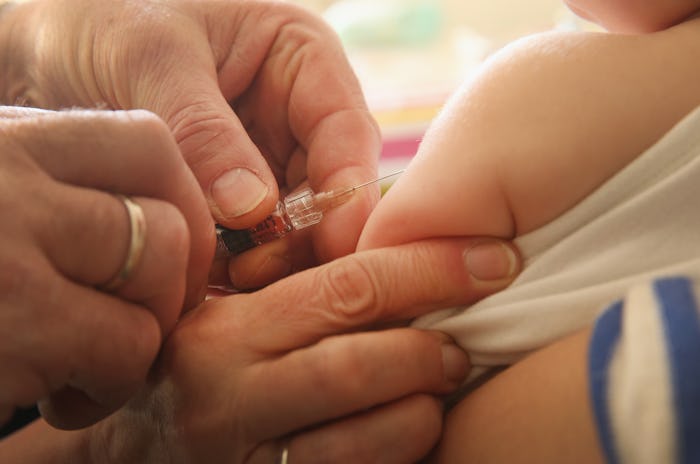Life

What Are State Laws On Vaccinations? In Some States, People Can Easily Opt Out
Whether you're a staunch anti-vaxxer or wondering what could possibly be so controversial about stopping the spread of deadly disease, chances are you should know what the state laws on vaccinations are, or if parents have total discretion to make those decisions. Parents, in recent years, have become concerned about potential links between vaccines and all sorts of health problems ranging from Autism to Febrille seizures. Health care providers, for their part, are doing what they can to convince parents that vaccines are a safe and necessary part of raising healthy children in modern America. But parents with deeply held beliefs that vaccines are dangerous for their children are proving tough to convince, leading to populations of kids going unvaccinated and bringing back diseases modern medicine all but wiped out, from measles to whooping cough. It's a red hot issue that strikes right at the heart of what every parent cares more about than anything — keeping their kids safe.
First, it's important to know how vaccinations rules, recommendations, and regulations are made, legislated, and enforced. The U.S. Federal Government, through the Centers for Disease Control and Prevention, issues guidelines it thinks are appropriate for American kids. It's then up to each individual state to make and enforce laws and regulations pertaining to vaccinations.
Federal Vaccination Guidelines
The CDC recommends kids under 2 years old get vaccines against 13 infectious diseases: measles, mumps, rubella, chickenpox, hepatitis B, diptheria, tetanus, whooping cough, Haemophilus influenza type B, polio, flu, rotavirus, and pneumococcal disease. But, again, federal agencies can only issue guidelines — it's up to each individual state to make its own laws, and each has its own rules. Major differences between states are in how they grant vaccine "exemptions."
State Vaccination Regulations
Every state has vaccination requirements for kids to enter public school; what varies wildly is the ease with which a parent can secure an exemption from vaccinating their child from the state. Every state offers an exemption for kids who are medically unable to get vaccines for any number of reasons. But that's where the continuity across state borders ends.
Pew Research did a big analysis of state exemption laws and found 46 allow religious exemptions from vaccinations. That includes 17 states that offer exemptions based on a more generic "personal reasons" basis.
The Strictest States
California, Mississippi, and West Virginia might not have much in common at first glance, but these three states won't offer any exemption from childhood vaccinations beyond medical necessity. In fact, in about a month, starting on July 1, 2016, California will have an active law prohibiting vaccine exemptions based on either religious or personal reasons. Pew found that California might just be the first state to adopt stricter laws against exemptions, and that other state legislatures are considering similar legislation, including Pennsylvania. Further, Colorado is making obtaining exemptions harder to get by requiring parents to file paperwork every year.
The Most Lax States
Minnesota has the most easily obtained state vaccine exemption, one that's based on a parent's general "personal reasons" in addition to a religious exemption. In Delaware, parents have to get a notarized affidavit stating their belief in a "Supreme Being" that's against childhood vaccines. In Oregon, you just need to get what's called a "vaccine education certificate" by taking an online course or getting a doctor's note.
If you're interested in finding out about your own state's laws about vaccination, the CDC offers this online tool to search state or territorial health department records.